Tadej Pogacar: Shark in sheep's clothing, Tour de France champion
Tracking the rise of the shy Slovenian with a killer instinct
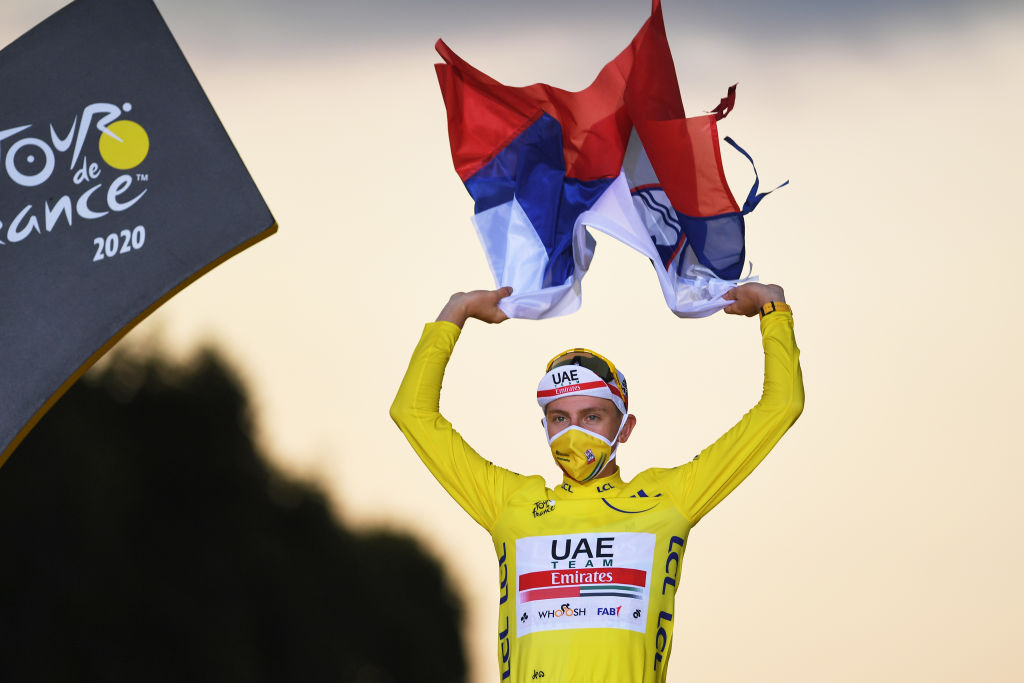
Before the Tour de France, there was a lockdown video that went viral – at least in the pro cycling corner of the internet. In it, a baby-faced, fluffy-haired 21-year-old raps awkwardly in Slovenian about coronavirus.
"If you still haven’t heard about it, it makes you sick, and it spreads so fast, come on wash your hands," he tells us.
Take him down to the rap battles in Ljubljana and you’d honestly worry for him. And yet, this is the same person who has snatched the biggest bike race in the world with the ruthless violence of a shark attack.
Tadej Pogačar is one of those athletes who, away from their sport, don’t look much like athletes at all – at least not the kind of elite competitors with the killer instinct to win the biggest contests.
Part of that is his youthfulness. Not only is he mind-bendingly young for a Tour de France winner – most of his contemporaries are just getting to grips with the U23s – but he also doesn’t even look his tender age. The other part of it is his personality: polite, calm, and – as he acknowledges in that rap – shy.
So how did Primož Roglič wind up at the top of La Planche des Belles Filles pale as a ghost, lungs convulsing, sitting upright on the tarmac, staring blankly into the middle-distance? Consoled by Tom Dumoulin and Wout Van Aert, who'd watched on the big screen in stunned silence, it was a scene of utter devastation.
"Tadej is a very simple, very honest person. He’s just a normal kid. But in a race, he’s really competitive," Andrej Hauptman, the former rider who nurtured Pogačar and is now on the UAE Team Emirates staff, tells Cyclingnews.
The latest race content, interviews, features, reviews and expert buying guides, direct to your inbox!
"When he sees that others are in difficulty, he’s like a shark."
The contrast between Pogačar’s outward appearance and his racing demeanour go back to his very first steps in the sport, and to Hauptman's very first encounter with him a decade ago, at a kids' race outside Ljubljana.
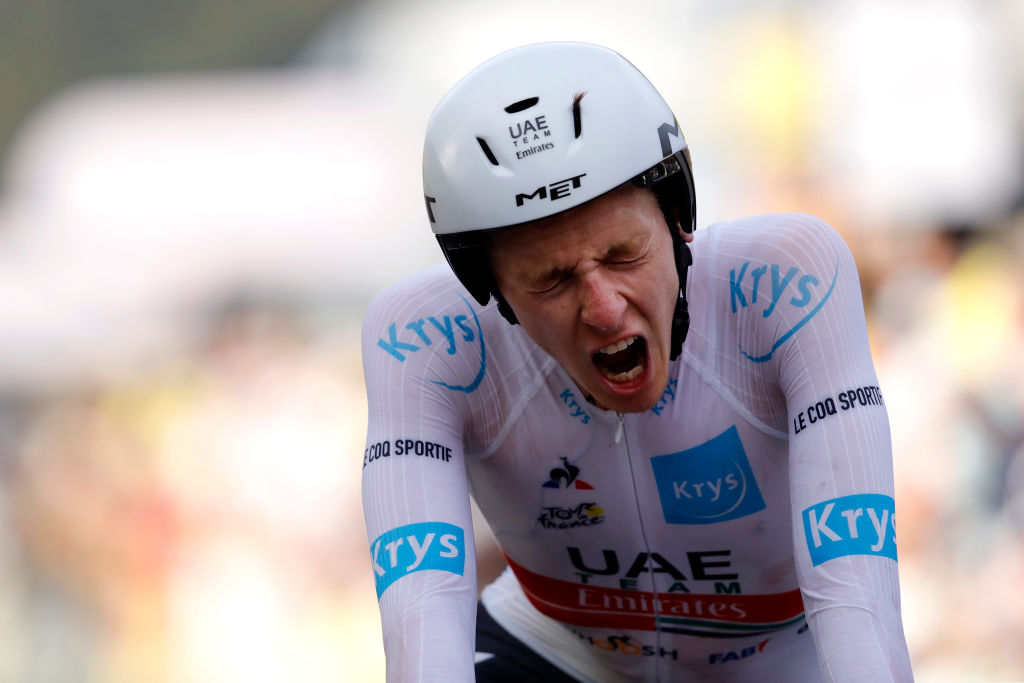
"I turned up a bit late for the race, and the first thing I saw was a big group of teenage riders leading and a small guy, much younger, lagging 100 metres behind trying to catch up," Hauptman said in a recent edition of Procycling magazine.
"I said to the organisers, we’ve got to do something to pace this little guy up to the front again, and they said, 'No, it’s not what you think. He’s in front. He’s lapped the whole field'. And that little guy was Tadej."
Pogačar had taken up cycling earlier than his parents – his father a furniture designer, his mother a French teacher – would have liked, eager to do whatever his brother, Tilan, older by two years, was doing. As a nine-year-old, he shouldn’t really have been racing, but he managed to worm his way into the Rog Radenska club after impressing family friend and local coach Miha Koncilja. Social media is similarly awash with photos of Pogačar the child on board a bike that's clearly far too big for him.
Hauptman and Koncilja both paint a picture of a young rider who, physically, appeared completely out of his depth. He took many a kicking, but there were consistent glimpses of the talent and attitude that would take him to the very top.
Still, the club scene in Slovenia and the Tour de France are galaxies apart.
Slovenia is a country with little cycling history. Since it gained independence after the breakup of Yugoslavia in 1991, it has only had modest success on the international stage. Hauptman was the first Slovenian to medal in the World Championships in 2001, while Tadej Valjavec recorded Grand Tour top 10’s in the late 2000s, Jani Brajkovič won the Critérium du Dauphiné, and Simon Špilak tasted success in a number of week-long races. There are currently nine Slovenians in the WorldTour, with Luka Mezgec, Matej Mohorič and Jan Polanc joining Pogačar and Roglič at the Tour.
It must be pointed out, however, that Slovenia has had just as much ignominy as glory; Valjavec and Brajkovič both served doping bans, while Borut Božič and Kristjian Koren were implicated in the Aderlass blood doping investigation. Bahrain McLaren boss Milan Eržen, considered the dominus of Slovenian cycling, was previously under the scrutiny of the UCI for his connections to the doctor at the heart of the investigation.
In terms of racing culture, there are only five UCI-categorised races in Slovenia – the Tour of Slovenia and four second-category one-day races. As for teams, there are two UCI Continental teams – Ljubljana Gusto Santic (where Pogačar would ride) and Adria Mobil (Roglič's old home) – and a smattering of regional teams, such as KK Kranj and Meblojogi Proconcrette.
"There is not a big road racing scene in Slovenia," David Črmelj, who works for Slovenian national television, tells us. "Because young cyclists can easily race in countries close to Slovenia, like Italy, Austria, and Croatia. Over those nearby borders, there are established racing scenes. There are races with long climbs, crosswinds, and with a high level, and they can really learn how to race hard."
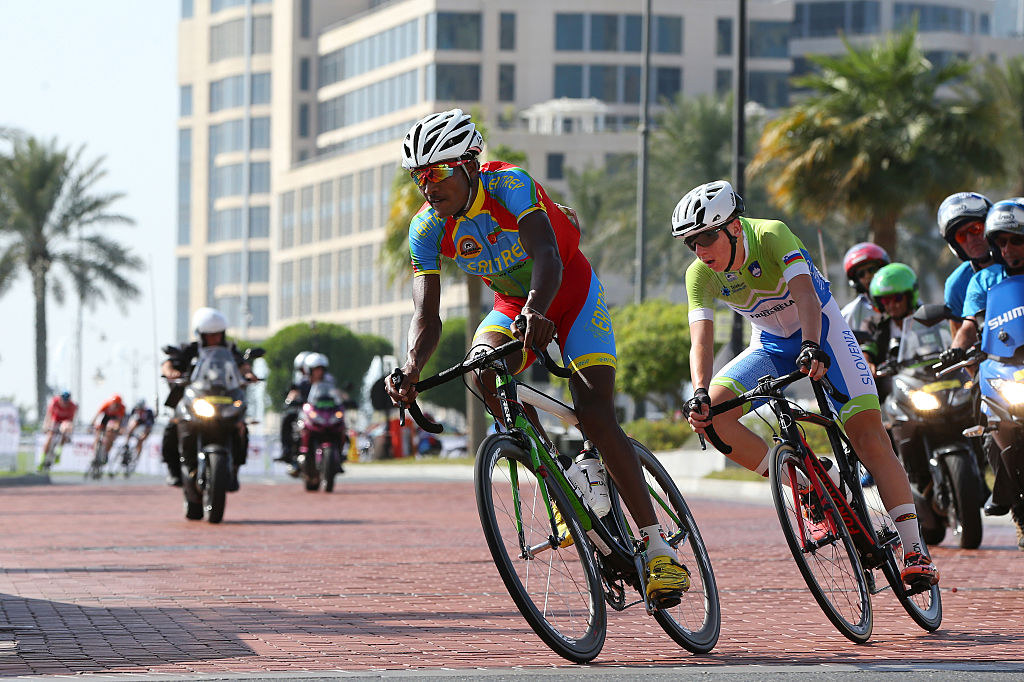
Pogačar’s exploits in his early years meant the Slovenian national cycling federation were ready to come calling as soon as he turned 16 and was able to race with a junior licence. He went to the Course de la Paix, one of the top international junior events, and finished eighth overall in 2015, before returning to win a stage the following year and going on to win the Giro della Lunigiana.
"As a junior, if you compared him with riders of his own age, let alone the bigger guys, he was smaller than most and his muscles weren’t so developed," says Hauptman. "But he made up for it by being a great racer, always in the right place at the right time, and he’ll rarely break under pressure."
He made up for it to such an extent that he made an early jump from the juniors to the espoirs, as he joined the Ljubljana Gusto Santic team for 2017. As well as the U23 calendar, he also rode a couple of professional races, placing fifth at the Tour of Slovenia – won by Grand Tour podium finisher Rafał Majka – and third at the Tour of Hungary.
Pogačar was still only 19 when he set out on the 2018 season – one which would catapult him to the top of the sport. At the U23 version of the Tour de la Paix, he showcased not only his talents but those attacking instincts, pulling off a sensational 30km solo victory on the final stage to snatch the overall title, having started the day sixth overall. He then went and won the Tour de l’Avenir, the biggest U23 race, won the previous year by Egan Bernal.
Naturally, WorldTour teams were circling, and it was UAE Team Emirates who led the way, thanks chiefly to the relationship that managers Mauro Gianetti and Giuseppe Saronni had with Hauptman. Pogačar considered Hauptman a father figure, such was the guiding role he'd played in his development, and part of the deal was that he'd stay by his side at UAE Team Emirates as he turned pro.
The precocious Pogacar had been a step ahead of the standard trajectory throughout his journey to the pro ranks, so why should it be any different once he got there? If anything, his development accelerated another notch.
After finishing 13th at the Tour Down Under on his WorldTour debut, he wasn’t even meant to go to the Volta ao Algarve, but was deemed to have recovered sufficiently from his trip to Australia and won the thing. Sixth at the Tour of the Basque Country – widely considered one of the hardest week-long races around – was arguably just as good, while overall victory at the Tour of California confirmed him not just as a star of the future but of the present.
He added the elite Slovenian time trial title and soon the results were too good to ignore. UAE Team Emirates had planned for him to make his Grand Tour debut in 2020, but he was fast-tracked into the Vuelta a España. Still, it was meant to be a learning experience – possibly with an early withdrawal – but a 20-year-old Pogačar stood on the podium in Madrid, third overall and winner of no fewer than three stages. The last of them, a 40km solo raid in a stormy Sierra de Gredos, which took him from fifth to third overall, underlined that this was a rider who takes big, bold swipes.
"My director radioed that I was going well, but advised me to stick to the wheels," Pogačar told Procycling. "But when I saw that López had attacked and made some mistakes, I went for it - all or nothing."
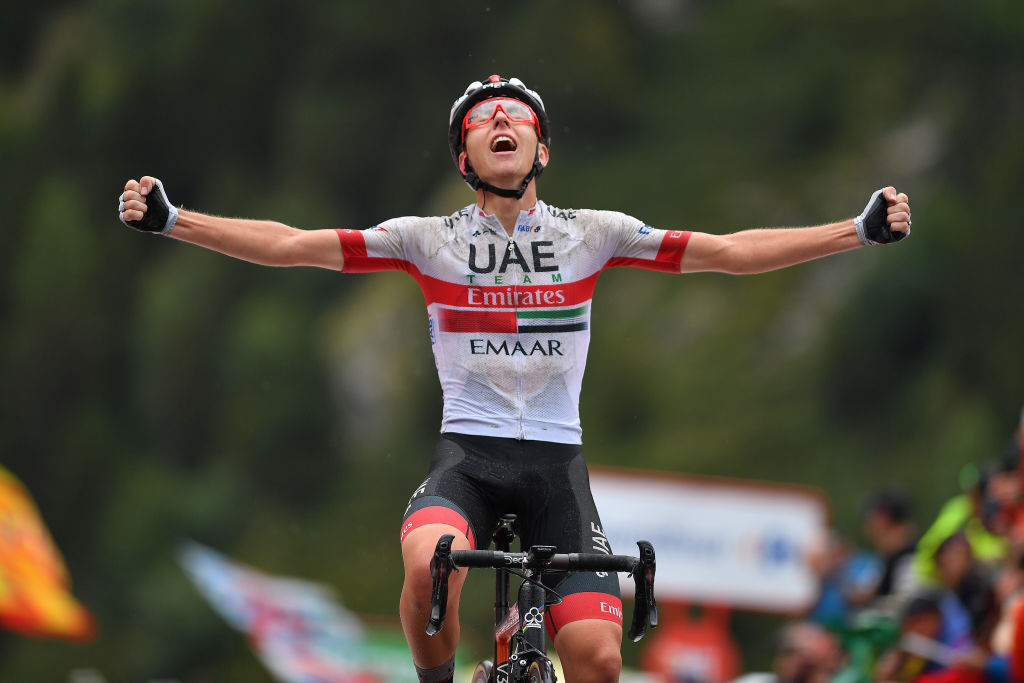
That winter, ahead of the 2020 season, Pogačar made the decision to leave Slovenia and make a home in Monaco, a haven for both taxation and bike riding and something of a hotbed of professional cyclists. He lives there with his girlfriend, Urška Žigart, a rider on the Alé-Cipollini Women's WorldTour squad and also the Slovenian time trial champion, who he met while on a national squad training camp in February 2017.
The rap video aside, Pogačar is said to have remained grounded in his new surroundings of super-cars and super-yachts.
"He hasn’t changed," his mother, Marjeta, told L'Equipe recently. "He still eats just as many crepes and has kept his humble passions away from the bike – his friends, TV series… Cycling takes up all his time, he has never even celebrated his birthdays, but that’s how he his, that’s how he’s always been.”
Pogačar’s meteoric rise continued into the 2020 season, with two stage wins and the overall at the Volta a la Comunitat Valenciana, followed by second at the UAE Tour, before the pandemic took hold. In a key precursor to the Tour de France, he beat Roglič in the time trial at June's Slovenian National Championships, but lost to him in the road race
A slightly subdued Dauphiné raised question marks over what he could achieve in the Tour, and his team were still insisting – publicly at least – that the more experienced Fabio Aru was team leader.
The past three weeks have been a whirlwind. Tadej Pogačar is a Tour de France champion at the age of 21 – the youngest winner and one of only eight debutant champions, alongside the likes of Eddy Merckx and Bernard Hinault. He did so a year younger than Egan Bernal last time around, and the Colombian’s victory – which had seemed to mark the start of a new era – begins to look a little less momentous when you consider that he didn’t win a stage. Meanwhile Pogačar won three, plus the yellow, white and polka dot jerseys.
It was an incredible display, marked by that mixture of calmness and bloody-mindedness. After losing a minute in the crosswinds on stage 7, he told Hauptman there was no use dwelling on it. The very next day he went out swinging and claimed 40 seconds back.
He won the following stage and won again a week later on the Grand Colombier, by which point Bernal had cracked and he’d installed himself as the biggest – indeed the only – threat to Roglič. He lost a little ground on stage 17's Col de la Loze, which made his time trial smash-and-grab all the more dramatic. It sent shockwaves through the sport and it's safe to say it was be a performance that will be talked about for decades to come.
Pogačar rode into Paris in yellow on Sunday evening, and made a short, polite speech on the podium, making sure to thank his family, who were watching on with pride on the Champs Elysées.
"We don’t see much of him anymore,” his mother had told L’Equipe. "We practically don’t speak on the phone. We use WhatsApp, because I don’t want to distract him. I always say ‘no news is good news’. That suits Tadej, who has always been a very laidback boy.
"What I used to like, when he still lived with us, was to sit down and have breakfast with him," she added. "His calmness rubbed off on me. He brought peace and joie de vivre to the whole family."
The shy, placid lad who just stormed the biggest race in the world. Tadej Pogačar, a shark in sheeps’ clothing, Tour de France champion.
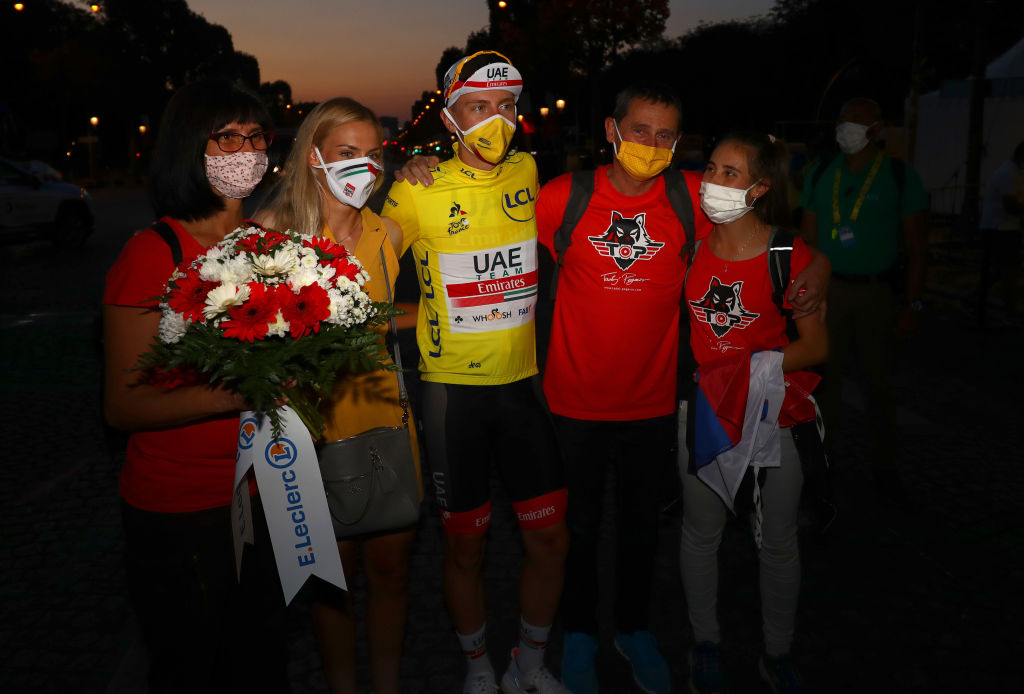
Patrick is a freelance sports writer and editor. He’s an NCTJ-accredited journalist with a bachelor’s degree in modern languages (French and Spanish). Patrick worked full-time at Cyclingnews for eight years between 2015 and 2023, latterly as Deputy Editor.
